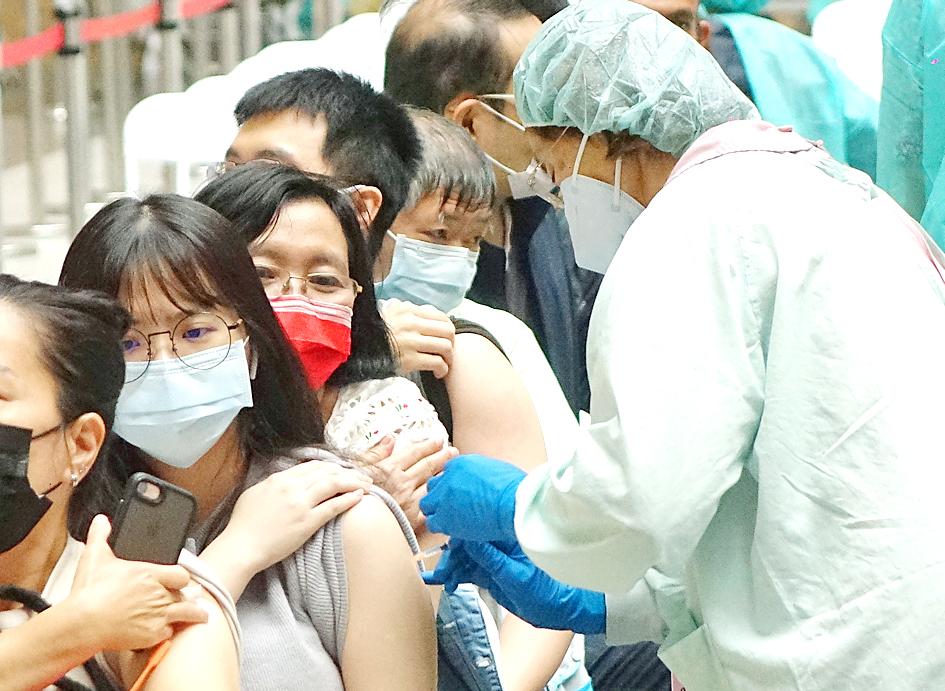Total premiums from sales of COVID-19 policies by local insurance companies grew to NT$1.91 billion (US$64.24 million) as of Monday, which is slightly higher than the cumulative amount of compensation of NT$1.8 billion paid to those infected or in quarantine, Financial Supervisory Commission (FSC) data showed.
The commission yesterday refused to forecast whether compensation would surpass premium income, but the data indicate that cumulative compensation rose much more rapidly over the past week than premium income — the amount of compensation grew 66 percent from NT$1.08 billion a week earlier, while premium income gained 3.2 percent from NT$1.85 billion.
The number of COVID-19 insurance policies sold rose 4 percent from a week earlier to 2.5 million, while a total of 49,904 policyholders had been compensated as of Monday, up 78 percent from 27,943 a week earlier, the data showed.

Photo: Pan Shao-tang, Taipei Times
Because many local insurance companies have stopped offering policies that compensate policyholders who are infected with COVID-19 or have to undergo quarantine, there are only four COVID-19 policies remaining on the market and they only offer coverage for those with severe symptoms, the data showed.
In related news, the FSC yesterday said that insurance companies cannot refuse to compensate those who choose to follow a “3+4” policy — isolate at home for three days and practice self-disease prevention for four days.
The commission’s comment came after lawmakers criticized some companies for rejecting the compensation claims of those who chose to follow the “3+4” policy, even though they were eligible to avoid quarantine by opting for the “0+7” policy.
The Central Epidemic Command Center on Monday announced that close contacts of COVID-19 cases who have received a booster shot no longer need to isolate at home and can choose to follow the “0+7” policy — just seven days of self-disease prevention.

NEW IDENTITY: Known for its software, India has expanded into hardware, with its semiconductor industry growing from US$38bn in 2023 to US$45bn to US$50bn India on Saturday inaugurated its first semiconductor assembly and test facility, a milestone in the government’s push to reduce dependence on foreign chipmakers and stake a claim in a sector dominated by China. Indian Prime Minister Narendra Modi opened US firm Micron Technology Inc’s semiconductor assembly, test and packaging unit in his home state of Gujarat, hailing the “dawn of a new era” for India’s technology ambitions. “When young Indians look back in the future, they will see this decade as the turning point in our tech future,” Modi told the event, which was broadcast on his YouTube channel. The plant would convert

‘SEISMIC SHIFT’: The researcher forecast there would be about 1.1 billion mobile shipments this year, down from 1.26 billion the prior year and erasing years of gains The global smartphone market is expected to contract 12.9 percent this year due to the unprecedented memorychip shortage, marking “a crisis like no other,” researcher International Data Corp (IDC) said. The new forecast, a dramatic revision down from earlier estimates, gives the latest accounting of the ongoing memory crunch that is affecting every corner of the electronics industry. The demand for advanced memory to power artificial intelligence (AI) tasks has drained global supply until well into next year and jeopardizes the business model of many smartphone makers. IDC forecast about 1.1 billion mobile shipments this year, down from 1.26 billion the prior

People stand in a Pokemon store in Tokyo on Thursday. One of the world highest-grossing franchises is celebrated its 30th anniversary yesterday.

Zimbabwe’s ban on raw lithium exports is forcing Chinese miners to rethink their strategy, speeding up plans to process the metal locally instead of shipping it to China’s vast rechargeable battery industry. The country is Africa’s largest lithium producer and has one of the world’s largest reserves, according to the US Geological Survey (USGS). Zimbabwe already banned the export of lithium ore in 2022 and last year announced it would halt exports of lithium concentrates from January next year. However, on Wednesday it imposed the ban with immediate effect, leaving unclear what the lithium mining sector would do in the